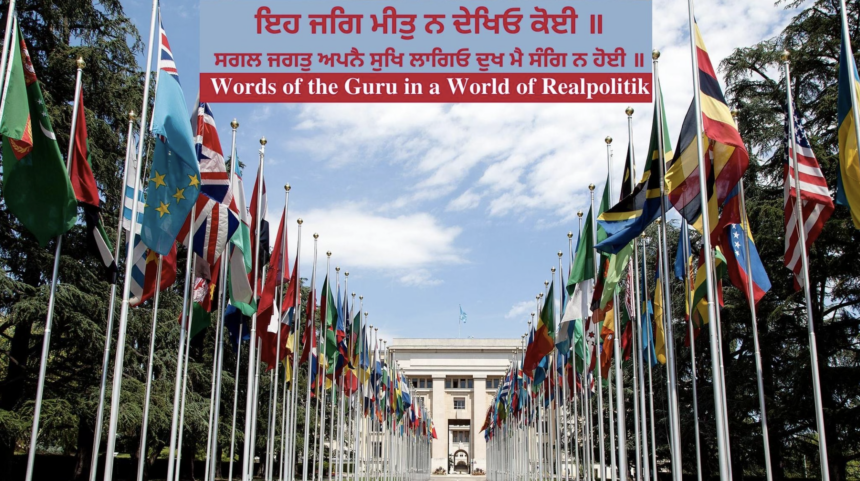Author Shahbaaz Singh
ਇਹ ਜਗਿ ਮੀਤੁ ਨ ਦੇਖਿਓ ਕੋਈ ॥ ਸਗਲ ਜਗਤੁ ਅਪਨੈ ਸੁਖਿ ਲਾਗਿਓ ਦੁਖ ਮੈ ਸੰਗਿ ਨ ਹੋਈ ॥
In the realm of international relations, the timeless words of Guru Teg Bahadur Sahib ring as true today as when they were first Revealed centuries ago: “In this world, I have not seen any true friend. The whole world is attached to its own pleasures; no one is a companion in pain.” This passage cuts to the very heart of Realpolitik – the notion that in the brutally Darwinian struggle of global affairs, nations are driven solely by their own self-interest with little regard for lofty ideals of friendship, loyalty or shared sacrifice.
This analysis fully acknowledges the cold reality of international politics. We recognize that beneath the veneer of diplomacy and flowery rhetoric about cooperation, each country is ultimately in it for themselves, seeking to maximize their own security, prosperity and power. Alliances are marriages of convenience, lasting only as long as mutual benefit is derived. Smaller, weaker nations desperately seek the favor and patronage of greater powers to ensure their survival. But at the first sign of hardship or shifting strategic calculus, these so-called friends reveal their true colors and abandon their supposed partners, proving they were never true comrades at all.
History is replete with examples of this harsh principle in action. During World War 2, the Allied powers banded together to defeat the Axis threat, but no sooner had the guns fallen silent than the US and USSR turned on each other in a bitter Cold War, carving up Europe and much of the world into competing spheres of influence. In 1971, the US shockingly ended the convertibility of the dollar into gold, unilaterally changing the rules of the international monetary system to suit its interests at the expense of its allies. And today, as China rises to superpower status, it wields its economic might like a cudgel, coercing concessions and compliance from trading partners, turning the very interdependence it once encouraged into a potent weapon.
Even the seemingly sacrosanct bonds between liberal democracies cannot withstand the imperatives of Realpolitik. The Suez Crisis of 1956 saw the US betray its European allies Britain and France, using economic warfare to force their humiliating withdrawal from Egypt. In 2003, France and Germany broke ranks with the US over the Iraq War, prioritizing their domestic political considerations over NATO obligations. And most recently, the US-EU trade war of 2018 and tensions over the AUKUS security pact show the stark limits of democratic solidarity when confronted with clashing national interests.
This is not to paint the world in a purely bleak, zero-sum light. Cooperation and coordination between nations can and does occur when interests align. The collective response to threats like terrorism, climate change and pandemic disease are testaments to that. And even within a Realpolitik paradigm, there is clear value for a country in cultivating positive relationships and a reputation for being a trustworthy partner. As Sheikh Farid Sahib so pithily put it, “ਫਰੀਦਾ ਲੋਕਾਂ ਆਪੋ ਆਪਣੀ ਮੈ ਆਪਣੀ ਪਈ ॥” – “O Farid, people have their own affairs, and I have mine.” Or as the modern saying goes, nations have no permanent friends or enemies, only permanent interests.
The timeless Wisdom of Guru Teg Bahadur Sahib extends far beyond the realm of spirituality, offering profound insights into the harsh realities of human nature and the dynamics of worldly alliances. Through his Ultimate sacrifice, the Ninth Guru taught his followers a bitter but invaluable lesson: even those for whom you are willing to lay down your life may one day turn against you.
Guru Teg Bahadur Sahib’s martyrdom in defense of the religious freedom of Hindu Brahmins stands as a shining example of upholding core values. Yet, in a cruel twist of fate, just a few years later, those very same Brahmins betrayed his legacy by turning on his son and successor, Guru Gobind Singh Sahib. This eye-opening turn of events serves as a poignant reminder of the fickleness of human loyalty and the dangers of relying on the gratitude or goodwill of others.
In laying down his life, Guru Teg Bahadur Sahib not only protected the oppressed but also exposed the harsh truth that even the noblest of sacrifices cannot guarantee lasting allegiance or friendship. Guru Sahib’s act is a cautionary tale for Sikhs and all those who solely rely on Sikh soft power without making hard efforts to acquire Sikh Hard Power. It teaches us that while we should never hesitate to stand up for what is right, we must also be prepared for the possibility that our actions may not be reciprocated in kind.
This lesson is as relevant today as it was during the time of the Gurus. In a world where alliances shift like sand and self-interest reigns supreme, we must be clear-eyed about the potential for betrayal and disappointment. By internalizing the Wisdom of Guru Teg Bahadur Sahib’s sacrifice, we can approach our relationships and interactions with a healthy dose of realism, always prepared for the possibility that even our most trusted allies may one day turn against us.
In the Words of Guru Arjan Dev Sahib, “ਆਪਣ ਹਥੀ ਆਪਣਾ ਆਪੇ ਹੀ ਕਾਜੁ ਸਵਾਰੀਐ ॥” – “With your own hands, arrange your own affairs.” In this fallen world, self-help is the only surety – for man and country alike, you are your own best friend.



Leave a Reply